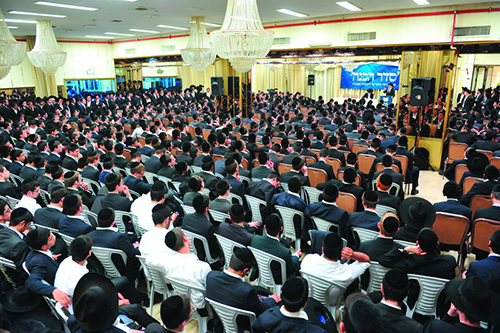
More than 1,500 bachurim set to enter Yeshiva Gedolah received guidance from leading Gedolei Yisrael at the sixth annual Dirshu Kinnus for bachurim going to Yeshiva Gedolah. The massive crowd represented communities from across Eretz Yisrael. Rav Gershon Edelstein, senior Rosh Yeshiva at Ponovezh, Rav Moshe Hillel Hirsch, Rosh Yeshiva of Slabodka, and Rav Uri Weissblum, mashgiach of Yeshiva Nachlas Haleveyim. The gathering on the Sunday before Tisha B’Av offered advice from the gedolim on how to properly transition from Yeshiva Ketanah to Yeshiva Gedolah and on how to maximize the Yeshiva Gedolah years.
The Importance of Preparing for a New Reality
Rav Edelstein, the nonagenarian Rosh Yeshiva of Ponovezh who has taught and guided many thousands of bachurim in his over 60 years as a maggid shiur and Rosh Yeshiva, addressed the bachurim with the sweetness of a grandfather who has lived through the varied experiences of life and is giving guidance to his grandchild. He said, “One of the most difficult aspects of the transition between Yeshiva Ketanah and Yeshiva Gedolah is the fact that a bachur is on his own in Yeshiva Gedolah. Whereas in Yeshiva Ketanah there are rebbeim and mashgichim accompanying you every step of the way, the more mature Yeshiva Gedolah bachur is expected to achieve much more on his own.
Yeshiva Gedolah,T he Foundation for a Life of Torah
Rav Yehoshua Aluf, the Rosh Yeshiva of Yeshiva Mishkenos Haraim, who chaired the evening, echoed this idea. He explained that in keeping with Dirshu’s mission as a great facilitator of Torah learning in our generation, Dirshu invested considerable effort to arrange such an evening of guidance for young bachurim beginning this new stage of life so that they can maximize these most crucial years.
Rav Moshe Hillel Hirsch, Rosh Yeshiva of Slabodka, said that as the boys enter this new era in their lives, they must understand that now is the time to invest every fiber of their being into their learning. “The primary success of any kollel yungerman stems from his years in Yeshiva Gedolah,” Rav Hirsch said. “If he utilizes them well and learns at a high level he will continue that ascent during his kollel years. If he does not, then his kollel years will reflect that as well…
“It is in these years that he must accept upon himself to fully and totally immerse in Torah learning and to develop real, authentic yiras shamayim. He must also make up his mind to wholly dedicate himself to cultivating good middos, to be humble, to listen to a sevara that his friend conveys instead of immediately rejecting it… Humility is the key to all other middos tovos.”
The Nuts and Bolts of Success
Rav Gershon Edelstein said,“The foundation of success in Yeshiva Gedolah is to truly understanding the shiurim. Towards that goal it is critical that a bachur prepare the Gemara with the meforshim on the sugya that the shiur will cover before he goes into shiur. Learning the Gemara once is not enough! One must learn it once and the next day learn it again. If he comes in doubly prepared, he has a far better chance of understanding the shiur. In addition, after the shiur one must review the shiur at least once on the day that it has been given and preferably even a second time on that same day. In this way, a bachur will understand both the shiur and the Gemara upon which it is based.”
Rav Gershon cautioned, “Many bachurim feel the need to be mechadesh their own chiddushim but now is not the time to say one’s own chiddushim. In Yeshiva Gedolah a bachur must try to understand the chiddushim of the maggid shiur. If one does that well, there will be plenty of time later in life to be mechadesh and the chiddushim will be much better…”
Rav Gershon went on to say it was equally important to observe mitzvoth bein adam l’chaveiro in yeshiva. A person who cares about his fellow bachur, a person who shows real kavod and deference to the maggid shiur and Rosh Yeshiva, will be successful in yeshiva. Yes, it is sometimes appealing to make a snide remark or good joke, but if it is at the expense of another it is a tremendous aveirah and can severely affect one’s shteiging.
The Many Differences
Rav Uri Weissblum, Mashgiach of Yeshiva Nachlas Haleveyim explained that the schedule is different, the way halacha is learned is different and that in Yeshiva Gedolah one sleeps in the dormitory, and that demands mental preparation. Acclimating to a dorm and cultivating the personal discipline to go to sleep on time and get up on time is new and requires thought and effort. This new, uncharted territory becomes much easier to navigate when a bachur enters Yeshiva Gedolah aware of what he will face, Rav Weisblum stressed.
“Bein Hazemanim is not Hefker Time!”
As the gathering was held right before bein hazemanim, Rav Edelstein said that bein hazemanim s a time for a bachur rest, have more time for himself to gather strength for the coming zman. But Rav Gershon reminded them that bein hazemanim is not hefker time. Every bachur should daven every day at the same time in the same place. There should be a set time to learn either with or without a chavrusah in the same place every day. One can learn easier limudim, or Gemara with Rashi. The main thing is that even “time off” should not be hefker.
By Chaim Gold













